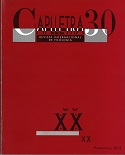Els marcadors pragmàtics compostos en el relat oral anglès i català
DOI:
https://doi.org/10.7203/caplletra.30.4958Paraules clau:
marcadors pragmàtics compostos, relat oral, anglès, català Resum
Resum
Pragmatic markers are linguistic units that the speaker uses to organize, recover, reformulate and segment the information that
s/he supplies to the hearer. They are a feature of oral rather than written discourse. They have little or no propositional meaning. By
means of pragmatic markers, the speaker transmits intentions, actions, and thoughts. They help to make a text coherent in as much as they are cues that facilitate the cognitive processing of information and constrain inferences and presuppositions. They are
multifunctional, operating at several discourse levels simultaneously: sequential, rhetorical and ideational (Redeker 1990). Their omission involves a violation of gricean cooperative principle, and the maxims of quantity and relevance in particular. The pairing of two or more pragmatic markers results into a compound pragmatic marker (CPM). These units facilitate, to a great extent, the shifts onto distinct contextual realms or discourse structures (ideational, sequential and rhetorical). Their combinatory functions result into a) a change of attentional state of the speaker or shift of cognitive frame, and b) a remarkable emphasis on the illocutionary point of the segment. When a CPM is used, the processing cost of information is lowered.
 Descàrregues
Descàrregues
Descàrregues
Publicades
Com citar
-
Resum368
-
PDF351
Número
Secció
Llicència
L’autor o autora que adrece un treball a la redacció de Caplletra perquè siga publicat ha de ser la persona titular legítima dels drets d'explotació. La legitimació per a la publicació del treball ha d’incloure també les imatges, les taules, els gràfics i altres materials que puguen complementar el text, amb independència de si n'és l'autor o autora.
Copyright. Quan publica el treball en la revista, l'autor o autora cedeix a Caplletra. Revista Internacional de Filologia els drets d'explotació (reproducció, distribució i comunicació pública), tant per a l'edició impresa en paper com per a la versió electrònica, que serà accessible mitjançant la xarxa Internet.
Tots els treballs publicats en Caplletra es troben sota una llicència Creative Commons del tipus Reconeixement-NoComercial-SenseObraDerivada 4.0.
RESPONSABILITAT
Caplletra. Revista Internacional de Filologia no s'identifica necessàriament amb els punts de vista mantinguts en els treballs que publica.
Caplletra. Revista Internacional de Filologia declina tota responsabilitat derivada de qualsevol vulneració eventual dels drets de propietat intel·lectual que poguera ser duta a terme pels autors o autores.






